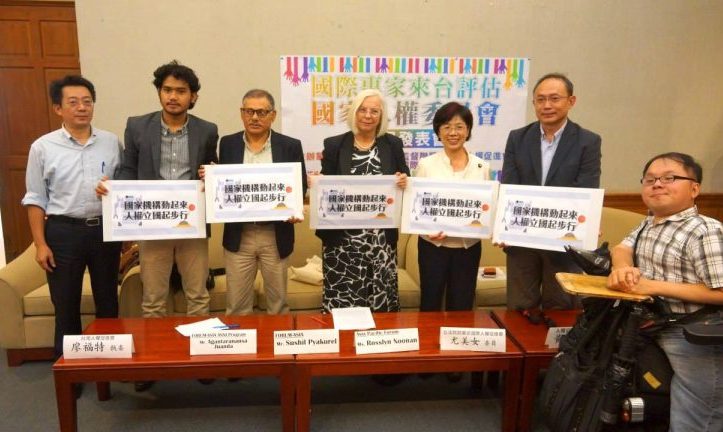International Expert Consultation on the establishment of an NHRI
Covenants Watch invited a mission with international experts to conduct consultations on the establishment of an NHRI in Taiwan. The mission, with Ms. Rosslyn Noonan, joined by Agantaranansa Juanda and Sushil Pyakurel, was sponsored by the Asia Pacific Forum of National Human Rights Institutions and the Asian Forum for Human Rights and Development (Forum-Asia) and it conducted a weeklong survey in July 2017. The mission conducted consultations with two dozen civil society representatives and scholars. At the end of their stay in Taiwan, they visited the Vice President of Taiwan and presented its preliminary observations and suggestions.
TAIWAN NHRI ASSESSMENT MISSION
There is strong support for the establishment of a National Human Rights Institution (NHRI) in Taiwan.
This is the conclusion of the Taiwan NHRI Assessment Mission following week long consultations with civil society organisations, senior officials in government agencies, with representatives of political parties, with the Judicial Yuan, the Control Juan and the Legislative Yuan.
We have also had a most welcome opportunity to brief the Vice-President on our initial findings.
Taiwan has taken major steps to strengthen respect for human rights by domesticating the International Covenants and human rights Conventions and by establishing a process for reviewing their implementation.
And yet, as in all societies, significant human rights challenges remain.
Those consulted told the Assessment Mission that a National Human Rights Institution would assist them to better tackle pressing and persistent the human rights issues.
The Assessment Mission reviewed the three options under consideration for establishing a NHRI here in Taiwan. The three options are:
- a stand-alone NHRI
- within the President’s Office
- as part of the Control Yuan
We took account of the views of those consulted, the advice of constitutional and legal scholars, the unique Taiwan context with its five powers, the most efficient use of resources, and the ‘Paris Principles’ – the international guidelines for the establishment of a NHRI.
None of the three options currently meets ‘Paris Principles. It is doubtful whether a NHRI in the President’s Office could ever meet the independence requirements of the ‘Paris Principles’. There were no advocates amongst those we consulted for a stand-alone NHRI.
The Control Yuan is not fully compliant with the ‘Paris Principles’. It is, nevertheless, our unanimous conclusion that the best option for establishing a national human rights institution at this time is to make it part of the Control Yuan. This means that the Control Yuan would have both a good governance mandate as at present, and a human rights mandate, both of equal significance.
Substantial changes to ensure full compliance with the ‘Paris Principles’ of a national human rights institution within the Control Yuan are required to the Organic Law of the Control Yuan and to the Control Act.
In 1993 the United Nations General Assembly adopted the ‘Paris Principles’, which set out the required elements for a National Human Rights Institution.
These are elements that will have to be considered in the changes to the Control Yuan Organic Law and the Control Act:
- the NHRI must be established in the Constitution or by law
- it must have a broad mandate both to protect and promote human rights
- the mandate must cover civil and political, economic, social and cultural rights and all sectors of society
- appointments to the NHRI must reflect the pluralism or diversity of the society and be made through an open and transparent process
- criteria for the appointments must include human rights expertise and experience
- the independence of the NHRI should be guaranteed in law
- the functions of the NHRI include providing advice to the legislature, to government, to the judiciary and to others; monitoring implementation of the international human rights standards; investigating or inquiring into violations of human rights; encouraging the provision of human rights education for government official and the wider community; and dealing complaints.
The ‘Paris Principles’ also stipulate that a NHRI must be accessible to all people and should cooperate with civil society on human rights activities to extend its effectiveness.
Should a National Human Rights Institution be established as part of the Control Yuan, we would respectfully suggest that consideration be given to interpreting in English the Mandarin Chinese term for the Control Yuan as “Guardian Yuan”, which we understand needs no change to the original Chinese.
Should the President and the Legislative Yuan proceed to establish a National Human Rights Institution, the Asia Pacific Forum of National Human Rights Institutions (APF) and Forum Asia ANNI are committed to assisting if requested.
It has been a privilege to serve on the Taiwan NHRI Assessment Mission. We thank Covenants Watch for inviting us and supporting the Mission so effectively. We have been encouraged by the genuine commitment of everyone we met to strengthening human rights for all the people of Taiwan. We are most appreciative of how generous people have been with their time, the thoughtfulness with which they have provided us with information and insights. We have been particularly impressed with the vital and energetic members of civil society who daily work to protect and promote and to advocate for human rights.
We hope that our report when it is finalised will be of some value to the people of Taiwan as you decide to establish a national human rights institution.
Rosslyn Noonan Sushil Pyakurel Agantaranansa Juanda


